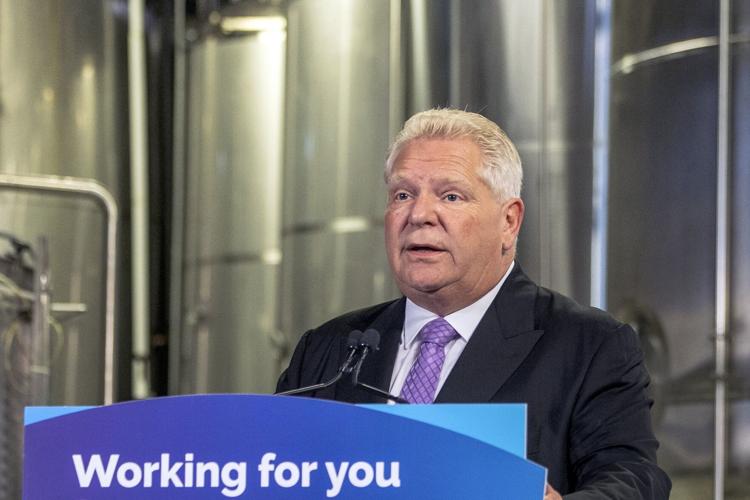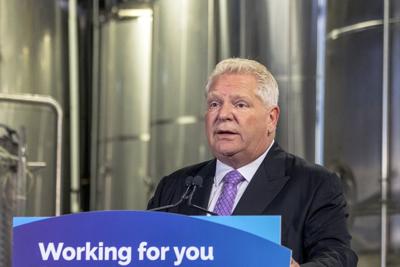HALIFAX ŌĆö Getting medications approved and into patientsŌĆÖ hands can take about two years in Canada ŌĆö when other countries approve in half that time, or less ŌĆö and it’s a concern Doug Ford wants to make a key issue at this year’s meeting of premiers.
The Ontario premier arrives Monday morning for the annual gathering of all 10 provincial and three territorial leaders, hosted this summer by Nova Scotia Premier Tim Houston, the current chair of the Council of the Federation. Ford takes over as head of the federation in August, and will host next summer’s meeting in Ontario.
“To ensure Canada maintains its advantage as a leader in health care innovation, we also need to get new publicly funded medicines to people as fast as possible,” a Ford spokesperson said Saturday.
“Currently, patients in Canada wait almost two years to access life-saving breakthrough medicines, a year longer than in other developed countries, placing us last in the G7. As Premier Ford takes over as chair of the Council of the Federation, one of his focuses will be doing everything possible to give Canadian patients the same timely access to life-saving treatments as patients in the rest of the world.”
The 13 premiers will meet with Indigenous leaders on Monday before holding a number of closed-door sessions on a range of topics over the following two days, including energy resources and independence, arctic security and sovereignty ŌĆö amid worries of ongoing Russian aggression ŌĆö as well as the U.S. election and what to expect from a Biden or Trump administration, especially in terms of protectionist trade policies.
They are also expected to address “revitalizing co-operative federalism in Canada,” which Houston recently wrote to Prime Minister Justin Trudeau about on behalf of all premiers, asking him to “work with us in a true partnership.”
“Canadians are facing immense and complex challenges that require all orders of government to work together,” Houston said in his July 11 letter.
“To revive the collaborative spirit of the federation, we urge the federal government to refrain from unilateral actions in areas of provincial and territorial jurisdiction, particularly in health care, education and housing. In areas of shared responsibility, timely outreach and engagement will ensure that our respective programs, funding and policies complement one another and are effective in each jurisdiction across Canada.”
Houston said “when all governments work together, we can find the best solutions for the challenges we face. This meeting will allow premiers to engage on the issues that matter most to Canadians.ŌĆØ
Ford’s spokesperson also said “in the face of global uncertainty, it’s never been more important for Ontario and Canada to have a secure and affordable homegrown energy supply that people and businesses can rely on.”
Ford “is keen to discuss the future of clean, reliable nuclear energy, including small modular reactors, and how provinces can work together to make it easier to build energy infrastructure across borders.”
Newly appointed Ontario Energy Minister Stephen Lecce recently held talks with U.S. Department of Energy officials and has since reached out to U.S. Secretary of Energy Jennifer Granholm for a meeting, in part to highlight the province’s technology as well as exporting nuclear energy to the states.
┬ĀAlberta Premier Danielle Smith will also stress “the importance of AlbertaŌĆÖs energy sector in the context of global energy security. Along with our emissions reduction strategies, the premier also hopes to discuss opportunities for collaboration in emerging sectors such as hydrogen, ammonia, and nuclear technologies,” said press secretary Sam Blackett.╠²
The country’s three northern premiers are hoping to highlight their unique needs on housing and infrastructure, as well as broader security issues.
“The NWT has benefitted greatly from the provincial-territorial relationships at the CoF table,” said Agata Gutkowska, press secretary for Northwest Territories Premier R.J. Simpson.
“With the system of consensus government to the co-management of lands and resources legislation with Indigenous governments the NWT is a unique jurisdiction in Canada.”
Yukon Premier Ranj Pillai is looking for better collaboration with the federal government and what the provinces and territories can do as a group to foster that given their “strong and productive” relations, as well as looking at keeping Arctic sovereignty “top of mind for all Canadians.”
That’s also a major concern for Nunavut Premier P.J. Akeeagok, who has been able to move new housing into high gear but more needs to be done to encourage people to live in remote communities ŌĆö including investments in things like hydro or even fibre optics ŌĆö┬Āwhich is part of the broader plan to boost security in the north.╠²
That issue received unanimous support from all 13 premiers at their meeting two summers ago, just months after Russia first invaded Ukraine.
“Arctic sovereignty and security are priorities for Nunavut at this yearŌĆÖs national premiersŌĆÖ conference,” Akeeagok said in a statement to the Star.
“Our territory wants to see investments in multi-use infrastructure such as deep sea ports that can address CanadaŌĆÖs security needs while revitalizing NunavutŌĆÖs economic potential. These are nation-building projects that address reconciliation while serving local Arctic communities.”
Last summer, when the premiers met in Winnipeg, Ford’s main focus was getting Ottawa to work with provinces to help big infrastructure projects move along faster, in particular to reduce delays and duplication, especially on environmental assessments.
In March, the province and federal government ended their spat over Ottawa’s insistence on environmental assessments on Highway 413 that Ontario officials said was causing construction delays.
The two levels of government instead signed a memorandum of understanding to create a collaborative working group to look at addressing environmental impacts. That came after a Supreme Court decision that found Ottawa had “overstepped” its authority on the provincial highway project, a key campaign promise of Ford’s.
┬ĀSmith also plans to raise “concerns regarding federal overreach into provincial jurisdiction, such as the recently established federal dental care program,” said Blackett.
Error! Sorry, there was an error processing your request.
There was a problem with the recaptcha. Please try again.
You may unsubscribe at any time. By signing up, you agree to our and . This site is protected by reCAPTCHA and the Google and apply.
Want more of the latest from us? Sign up for more at our newsletter page.






























To join the conversation set a first and last name in your user profile.
Sign in or register for free to join the Conversation